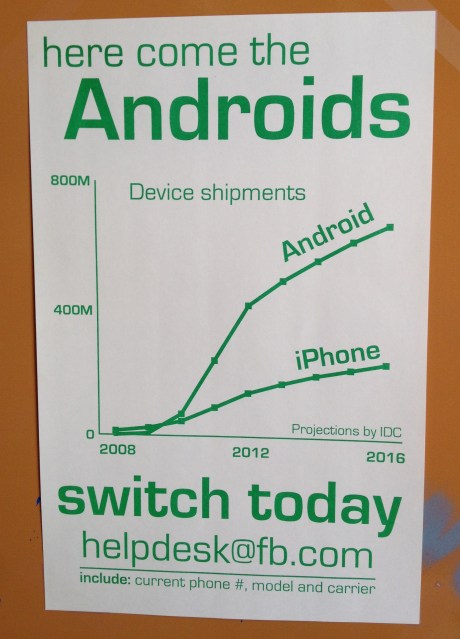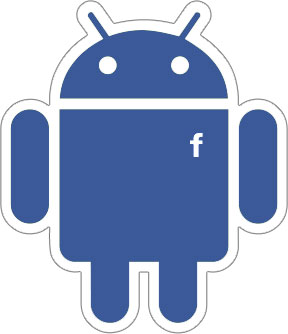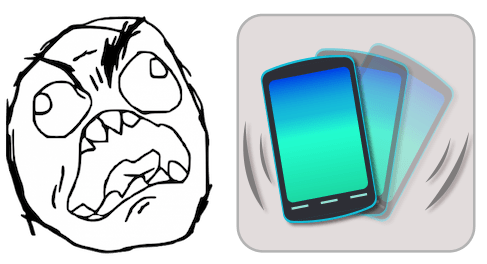“In the early days we gave employees iPhones primarilyâ€, a Facebook spokesperson tells me. That decision and the rise of Android has left Facebook scrambling to get employees dogfooding its apps for Google’s OS. Now the company’s headquarters is plastered with these eye-popping posters asking Facebookers to “switch todayâ€, and fix Android flaws with its secret bug reporting tool “Rage Shakeâ€.
Facebook is making a shift. Not just to mobile, but to a balanced focus across mobile through an informal program to nudge employees to Android. It was first mentioned by Business Insider’s Owen Thomas in August and I’ve since investigated. The campaign casually known as “Droidfoodingâ€, a portmanteau of Android and dogfooding â€" eating your own dogfood aka testing your own products.
I’ve attained some photos of the vaguely propagandistic posters found around Facebook’s Menlo Park campus. The most telling one is a graph of the International Data Corporation’s projection for shipments of Androids vs iPhones. It shows Google’s OS getting bundled with twice as many devices as Apple’s by 2016. If Facebook can’t even out the ratio of iOS to Android-toting employees soon, it could end up neglecting the vast majority of its smartphone app users.

The problem started because the first iPhone was just a heck of a lot better than initial Android handsets. Apple’s integrated OS and device plus early traction made it much more attractive to Facebook employees. Sure it cost more, but why not take the most advanced phone on the market if they weren’t footing the bill?
That caused a disconnect, though. Most people do have to think about the cost of their mobile handset. They might not be perfect or have micron-precision industrial design, but Androids get the job done. They surf the web, manage email, provide maps, and offer access to Facebook. If the social network wants to give Android users the best experience, it needs a fair portion of the company testing its Android apps and brainstorming what could be done next with the operating system’s flexibility.
 That’s the goal of Droidfooding. While the default choice for what phone employees got used to be an iPhone, a Facebook spokesperson tells me that now “We don’t encorage one device over another. We let employees choose.†When I asked what the breakdown of iOS to Android users is in the company, Facebook’s spokesperson admitted “I don’t have a ratio but with the early focus on our iPhone app and the multi-year cycle of carrier contracts we do have more iPhones deployed.â€
That’s the goal of Droidfooding. While the default choice for what phone employees got used to be an iPhone, a Facebook spokesperson tells me that now “We don’t encorage one device over another. We let employees choose.†When I asked what the breakdown of iOS to Android users is in the company, Facebook’s spokesperson admitted “I don’t have a ratio but with the early focus on our iPhone app and the multi-year cycle of carrier contracts we do have more iPhones deployed.â€
The campaign is starting to take hold, though. “We’ve created more awareness that Android devices are available†Facebook says. Now, “there’s plenty of people here carrying around both devices, and not just engineers and not just mobile people.†So while the posters ask employees to “switchâ€, it seems they’re pretty attached to their Apple products. At least there are more Androids in pockets at 1 Hacker Way.
Once they’re there, the company tries to make it as easy as possible to test the next generation of its Android apps. During my digging I found out Facebook forcibly updates employees to the most recent beta version of apps like Facebook For Android and Facebook Messenger. If they run across a problem in one of the Android (or iOS) apps, they can take advantage of a bug reporting feature Facebook builds into its internal betas.
It’s called “Rage Shake†and the name is spot-on. Employees just violently shake their phone and it automatically logs its current state and sends in details to Facebook’s mobile bug-squashers. The Google+ team apparently also has a “Rage Shake†feature and even gave access to it to end users, though it’s unclear which company had if first.
By avoiding a more complicated manual reporting process, Facebook maximizes the number of bugs it hears about from its 4,000 employee-testers. If Facebookers like the taste of Droidfood, they could make sure it’s not their actual users shaking their phones in fits of anger.

[Image Credit: TalkAndroid, Techno18]
February 1, 2004
NASDAQ:FB
Facebook is the world’s largest social network, with over 1 billion monthly active users. Facebook was founded by Mark Zuckerberg in February 2004, initially as an exclusive network for Harvard students. It was a huge hit: in 2 weeks, half of the schools in the Boston area began demanding a Facebook network. Zuckerberg immediately recruited his friends Dustin Moskovitz, Chris Hughes, and Eduardo Saverin to help build Facebook, and within four months, Facebook added 30 more college networks. The original...
No comments:
Post a Comment